Can Breastfeeding Alone Prevent Dehydration in Babies?
Getty images

Written by Mindsmaking Medical Writer
Fact Checked by Mindsmaking Professionals
18th, November, 2025
Breast milk is 80% water and essential for baby hydration, but is it always enough? Learn when breastfeeding alone may not prevent dehydration, the warning signs to watch for, and simple ways to keep your baby hydrated and healthy.
Infants rely entirely on breast milk or formula for their hydration and nutritional needs during the first six months of life. This makes it especially important to understand how breastfeeding works in maintaining hydration, and when it might not be enough on its own.
Breastfeeding is one of the most natural and effective ways to nourish and hydrate a newborn. It is widely recommended by health professionals for its comprehensive nutritional benefits, emotional bonding, and immunity-boosting properties. But one common question that many new mothers ask is, “Can breastfeeding alone prevent dehydration in my baby?”
Key Takeaways
Breast milk contains 80% water. It’s a complete source of hydration and nutrition for babies.
Feed every 2–4 hours. Regular feeding helps maintain hydration levels.
Watch for dehydration signs, Dry mouth, fewer wet diapers, and irritability that need attention.
In illness or heat, extra care is needed. Breastfeeding may need to be supported with medical advice. Don’t give plain water to babies under 6 months. Their kidneys aren’t ready for it.
Don’t give plain water to babies under 6 months. Their kidneys aren’t ready for it
Can Breastfeeding Alone Prevent Dehydration in Babies?
Yes, breastfeeding alone can generally prevent dehydration in babies, especially in the first six months. Breast milk is made up of about 80% water and provides all the hydration a healthy baby needs during this period (2). As long as your baby is feeding regularly, typically every 2 to 4 hours, and showing signs of proper hydration (such as frequent wet diapers, alertness, and steady weight gain), additional water or fluids are not necessary (3).
However, if your baby is experiencing vomiting, diarrhea, fever, or has been exposed to extreme heat, they may lose more fluids than they take in. In such cases, breastfeeding might not be enough on its own, and you should consult a healthcare professional. They may recommend more frequent feeds or oral rehydration solutions, depending on the severity of dehydration (1) (5) (6).
Always monitor your baby’s behavior and diaper output, and seek medical advice if you’re concerned.
How Much Water Does Breast Milk Provide?
According to the World Health Organization (WHO) (8), breast milk is composed of about 80% water, especially in the early, watery foremilk that a baby drinks at the beginning of a feed. This makes breast milk a powerful hydrator in addition to being a source of essential nutrients, antibodies, fats, and calories.
So, when a healthy baby is exclusively breastfed, they usually do not need any additional water or fluids, even in hot climates (3). The WHO and UNICEF recommend exclusive breastfeeding for the first six months of life for precisely this reason (4).
How Often Should a Baby Be Breastfed?
To maintain hydration, regular feeding is key. Newborns typically need to be breastfed every 2 to 4 hours, including during the night. That means feeding your baby about 8–12 times in a 24-hour period (7).
These frequent feeds ensure that the baby not only receives enough milk but also stays hydrated throughout the day. Skipping feeds or going long intervals between them may reduce fluid intake and increase the risk of mild dehydration, especially in very young infants.
When Breastfeeding May Not Be Enough to Prevent Dehydration
Despite its benefits, there are circumstances where breastfeeding alone may not be sufficient to prevent dehydration. These include:
- Illnesses like diarrhea or vomiting. These conditions lead to rapid fluid loss. Even if you continue breastfeeding, it might not replenish fluids quickly enough without medical support.
- Fever or high temperature, When a baby has a fever, they sweat more and breathe faster, losing more fluids.
- Hot weather, while breast milk usually suffices, very hot environments can still lead to dehydration, especially if feedings are less frequent.
- Breastfeeding challenges, Such as Low milk supply, poor latch, or shorter feed durations, may prevent the baby from getting enough fluids.
In such situations, it’s essential to watch for signs of dehydration and seek guidance from your healthcare provider.
Read This Next
No posts available
How to Ensure Your Baby Gets Enough Fluids
To make sure your baby is getting enough fluids through breastfeeding, here are a few helpful habits to establish:
- Feed on demand, let your baby guide feeding times rather than sticking strictly to a schedule.
- Watch for hunger cues, Rooting, sucking motions, or hand-to-mouth behavior may indicate thirst.
- Ensure proper latch. A good latch helps your baby draw enough milk and prevents fatigue or shallow feeds.
- Stay hydrated yourself. Breastfeeding mothers need more water to maintain milk supply—drink regularly and eat nourishing foods.
- Avoid supplementing unnecessarily. Introducing formula or water without a medical need may interfere with milk supply and hydration balance.
sparklestroke

How to Support Yourself Mentally and Emotionally
Caring for a dehydrated baby can be overwhelming. If you’re navigating breastfeeding challenges or health concerns, you’re not alone. Mindsmaking is dedicated to supporting moms not just with information, but with real, calming tools like:
- Guided meditations to help during stressful feeds
- Tips for postpartum hydration and nutrition
- Parenting support communities for emotional well-being
Remember, your well-being is crucial to your baby’s health. A calm, supported mother is more likely to breastfeed effectively and notice important cues early.
Helpful Tools for Hydration & Breastfeeding
To support your breastfeeding journey and help monitor your baby’s hydration, here are a few mom-recommended products we love. These may also include affiliate links that help support the work we do at Mindsmaking — at no extra cost to you:
- BPA-Free Baby Bottles – Ideal for storing pumped breast milk safely and conveniently.
- Hydration Tracker Water Bottles for Moms – Staying hydrated is just as important for you as it is for your baby.
- Reusable Breast Pads – A gentle way to stay dry and comfortable while breastfeeding more frequently.
- Baby Thermometers – A must-have for checking fevers, which can be an early sign of dehydration.
We only recommend tools that align with our mission to support healthy, informed parenting.
Was this article helpful?
How many stars are you giving this article?
Leave a comment
Your email address will not be published.